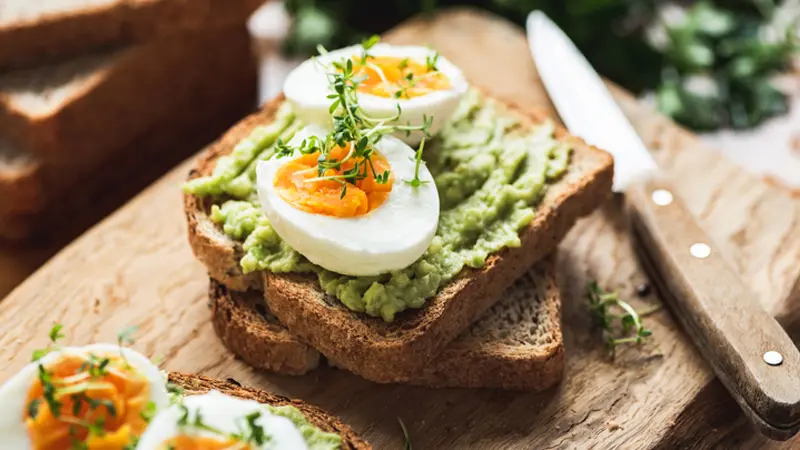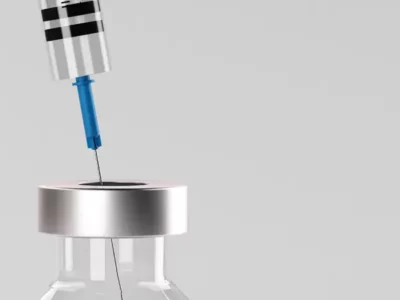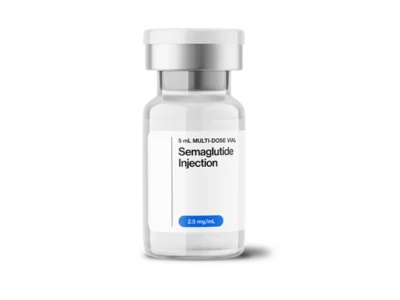- Home
- Growth Hormone
- Growth Hormone
- Growth Hormone Deficiency
- Growth Hormone Therapy
- Growth Hormone Injections
get startedThe Most Effective Hormone Replacement TherapiesWhat to Eat and Not to Eat While Taking Semaglutide
To achieve the best weight loss results on semaglutide you must make changes to your daily dietary habits.
Anti-obesity medications like semaglutide can be valuable tools in your weight loss efforts. But it’s essential to remember that it’s not a miracle pill that works without dietary and lifestyle adjustments. What you do and do not eat is an important part of any medical weight loss program that includes semaglutide injections.
In addition to overall caloric reduction, there are certain foods you should not eat and others you should make sure to add to your diet to get the most out of taking semaglutide. When you eat a healthy, balanced diet, it complements the appetite-suppressing effects of this medication, making it easier to adhere to a reduced-calorie intake, which is essential for weight loss while taking this medicine.
How Semaglutide Works
Semaglutide is a medication designed to help you lose weight by curbing your appetite. It belongs to a class of medications known as GLP-1 receptor agonists, which work by mimicking the action of a natural hormone called GLP-1. Here’s how medications like this lead to significant weight loss:
- Appetite Suppression: GLP-1s help reduce your appetite, making it easier to control your food intake. You’ll feel fuller for longer periods, which can help you eat less.
- Slowed Digestion: This medication slows down gastric emptying which can further enhance the feeling of fullness and reduce the urge to overeat.
- Blood Sugar Control: These medications can also help regulate blood sugar levels, which may be beneficial for individuals with diabetes or those at risk of developing the condition.
The time it takes for this type of weight loss drug to start working will vary among patients. However, most people begin to experience a decrease in appetite within the first few days to weeks of starting on the medication. These effects are enhanced when the drug is used in combination with diet and lifestyle modifications.
The Role of Diet With Semaglutide
It has been well-documented that eating a properly planned diet while taking semaglutide is required to support its weight loss benefits, minimize possible side effects, and promote overall health and well-being. In clinical trials, the participants who lost the most weight – as much as 16% of their total body weight – did so when combining the drug with calorie restriction and a balanced, well-planned diet.
Once you have accepted that changing your diet is all part of how to use medications like this correctly and effectively, you will be far more likely to reach your health goals. The best diet to eat while on semaglutide is one that includes foods that are low in calories, saturated fats, and sugars and high in lean protein, fiber, and other essential nutrients. Such a diet will help you get the most out of taking this kind of weight loss drug.
Here are some of the other benefits of eating right while on semaglutide.
- Improved nutrient intake: Weight loss drugs like this can reduce appetite, but they don’t provide essential nutrients. A healthy diet ensures that your body receives the necessary vitamins, minerals, and other nutrients to maintain good health. Nutrient deficiencies can occur if you rely solely on the drug and neglect your diet.
- Sustainable weight loss: Weight loss drugs can be effective in the short term, but they may not provide lasting results on their own. When you incorporate healthy eating habits into your lifestyle, you’re more likely to sustain your weight loss over time. This is essential for preventing weight regain once you stop taking the medication.
- Health benefits beyond weight loss: A healthy diet offers numerous health benefits beyond weight loss, such as improved cardiovascular health, better blood sugar control, and reduced risk of chronic diseases like diabetes and heart disease. Combining GLP-1 type medications with a nutritious diet can contribute to overall well-being.
- Side effect management: Like any medication, semaglutide may have side effects, including nausea, diarrhea, and changes in appetite. A healthy diet can help manage these side effects. For example, eating smaller, more frequent meals can alleviate nausea, and a diet rich in fiber can help with digestive issues.
What Not To Eat While on Semaglutide
In order to maximize your results on this drug, it’s crucial to avoid certain foods. Here is a detailed list of foods to avoid, along with reasons why they should be eliminated from your diet and healthier alternatives:
Ultra-Processed Foods
Avoid high-fat foods and foods high in added sugars, refined grains, and unhealthy fats. These can lead to excessive calorie intake and insulin spikes. Instead, opt for whole foods like fruits, vegetables, and whole grains.
Fried Foods
Fried foods, spicy foods, and greasy foods are typically high in unhealthy fats and calories. Opt for baked, grilled, or steamed options for a healthier choice.
Sugary Beverages
Sugary drinks like soda, fruit juices, and energy drinks can contribute to weight gain. Choose water, herbal tea, or sparkling water with no added sugar.
Fast Food
Fast food is often loaded with calories, unhealthy fats, and sodium. Cook homemade meals with lean proteins, vegetables, and whole grains instead.
Sweets and Desserts
High-calorie desserts and sweets should be limited. Choose fruit or yogurt as a healthier alternative when you have a sweet craving.
Alcohol
Alcohol contains empty calories, and alcohol intake can impair your judgment, leading to poor food choices. If you drink, do so in moderation and choose lower-calorie options.
High-Carb, Low-Nutrient Foods
Foods like white bread, white rice, and sugary cereals can cause blood sugar spikes and crashes. Instead, choose whole-grain alternatives for better blood sugar control.
What to Eat When Taking Semaglutide
Our doctors have found that what you eat while on semaglutide is as important as how much you eat. The most important thing to eat while on this drug is adequate amounts of lean protein.
Protein is your body’s main source of essential amino acids. Your body cannot make or store amino acids, so it must get them from the foods you eat, and protein intake is your primary source of amino acids. Lean protein is one of the most important nutrients for you to eat while taking these kinds of weight-loss drugs. Since you will be eating less overall, it is essential that you boost your intake of lean protein to keep your body strong and healthy while on semaglutide. Protein-rich foods are also low in carbohydrates and sugar, which helps keep your blood sugar balanced and promotes weight loss.
Other than protein, the next most important food to eat while on GLP-1 medications is vegetables, followed by fruits, whole grains, and healthy fats. By embracing nutrient-dense foods while limiting fried foods, highly processed meals, and sugary options you will enhance your results on semaglutide.
Here’s a sample meal plan to follow while taking semaglutide. Please consult with our medical team for personalized recommendations based on your specific needs and goals:
Breakfast
- Scrambled eggs with spinach and tomatoes
- Whole-grain toast
- A serving of mixed berries
Lunch
- Grilled chicken salad with mixed greens, cherry tomatoes, and vinaigrette dressing
- Quinoa or brown rice on the side
Snack
- Greek yogurt with a drizzle of honey and a handful of almonds
Dinner
- Baked salmon with asparagus and quinoa
- Steamed broccoli or green beans
Snack (If Needed)
- Sliced cucumber with hummus
It’s essential to work with our medical team and speak with our dietitian about foods to create a plan that fits your specific calorie needs. However, a general guideline for daily caloric intake while taking semaglutide is typically around 1,200 to 1,500 calories per day.
Is There a Best “Semaglutide Diet”
There is no "one-size-fits-all diet for semaglutide patients, but here are some guidelines that can help you achieve your health goals.
While there is no requirement to cut out carbs on semaglutide, healthy diets, such as the Mediterranean Diet or DASH Diet, tend to work very well while taking it. Also, people who are obese to the point where they have been prescribed this drug may already be on one of these types of diets due to related health conditions such as diabetes or high blood pressure.
The diet that will work best along with this drug will vary from patient to patient. Generally speaking, diets that consist of nutrient-dense foods along with lean protein and fiber-rich foods, work very well and are easier to stick to when combined with the appetite-curbing effects of semaglutide. Let’s take a closer look at some popular diet plans and see which work best while on semaglutide.
Intermittent Fasting or IF
In intermittent fasting, you only eat during a specific time. Research shows fasting for a certain number of hours each day or eating just one meal every few days can help you lose weight. Semaglutide, with its appetite suppressant abilities, naturally encourages intermittent fasting, and if you want to try a specific intermittent fasting regimen, being on this medication makes it a lot easier to do so.
Mediterranean Diet
The Mediterranean diet has been identified as a great one for weight loss and a “heart-healthy” diet. With its emphasis on fruits, veggies, whole grains, and healthy fats like olive oil, the Mediterranean diet focuses on foods that will keep you fuller for longer, which makes it a perfect match for people taking Semaglutide. Many studies have found that the Mediterranean Diet can improve heart health, lower cholesterol, decrease high blood pressure, and lower blood sugar levels.
Keto Diet
The Ketogenic or Keto diet emphasizes low carbs and high fat. Carbohydrates are your body’s main source of fuel or energy. The theory behind the Keto diet is that by severely limiting your carb intake, you force your body into a state of “ketosis,” where it supposedly turns fats into ketones and burns them for fuel instead of carbohydrates. There is much debate on whether this hypothesis is correct or not. Given the recommendations for whole grains while taking this drug and the effects that GLP-1 medications have on glucose metabolism, Keto is probably not a good choice when taking semaglutide.
DASH Diet
“DASH” stands for Dietary Approaches to Stop Hypertension, and it is a diet designed to restrict salt intake to combat high blood pressure. One look at the DASH diet, and you will quickly see that it emphasizes all of the foods we suggested earlier that you eat while on this drug. The cornerstones of the DASH diet are fruits, vegetables, beans, whole grains, low-fat dairy products, and lean proteins like chicken and fish. Sound familiar? Like the Mediterranean Diet, the DASH diet is an ideal one to follow while on semaglutide, and since many patients taking the drug may have high blood pressure, they may already be, or should be, on the DASH Diet.
Vegan or Plant-Based Diet
Plant-based diets encourage you to eat more fruits, vegetables, beans, whole grains, nuts, and vegetable oils. As mentioned above, we advise people on semaglutide to eat more fruits and veggies. However, going entirely animal product-free, such as completely Vegan, may not be the best choice for those on semaglutide as it may make it difficult or impossible to get the necessary protein.
How to Maintain a Healthy Diet While on Semaglutide
Staying on a healthy diet while taking semaglutide is crucial for long-term weight loss success. Here are some tips to help you on your journey:
- Meal Planning: Plan your meals in advance to ensure you have a healthy mix of foods readily available.
- Portion Control: Pay attention to portion sizes to avoid overeating, even when you’re feeling less hungry.
- Regular Exercise: Incorporate regular physical activity into your routine to support weight loss and overall health.
- Hydration: Drink plenty of water throughout the day to stay hydrated and help control hunger.
- Monitor Progress: Keep a food diary and track your progress to stay motivated and identify areas for improvement.
Semaglutide can be a valuable tool for successful weight loss, but keep in mind that it’s most effective when used in conjunction with a healthy diet. This combination addresses both the physiological and behavioral aspects of weight management, leading to better and more sustainable results.
read this next
Semaglutide Side Effects
Understanding Semaglutide Side Effects Semaglutide was the first drug of its kind to receive approval for weight loss. As such it is generally regarded…read moreWho Should Not Take Semaglutide
Semaglutide, the active ingredient in many of the latest weight loss drugs, can provide remarkable weight loss for many obese adults, but it is…read moreWhere to Inject Semaglutide. Guide From the Kingsberg Medical
Semaglutide is a popular medication for weight loss. It is given via subcutaneous injections. That means where you inject semaglutide is just below the…read moreHow Long Does Semaglutide Stay in Your System?
Semaglutide has been proven in clinical outcomes to be quite effective for weight loss. Medical professionals and clinical trials have found people losing dozens…read more - Growth Hormone Therapy






























